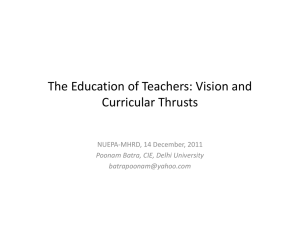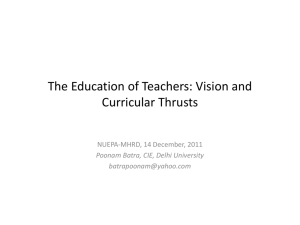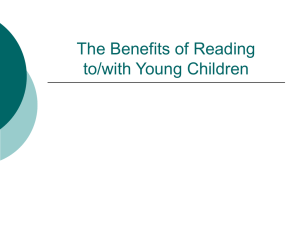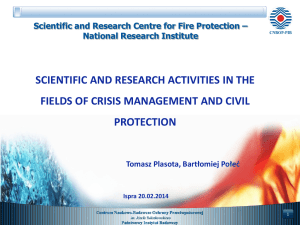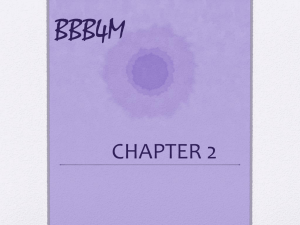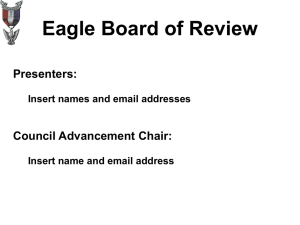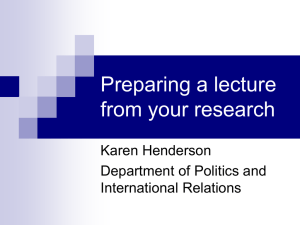PPT - Teacher Education
advertisement
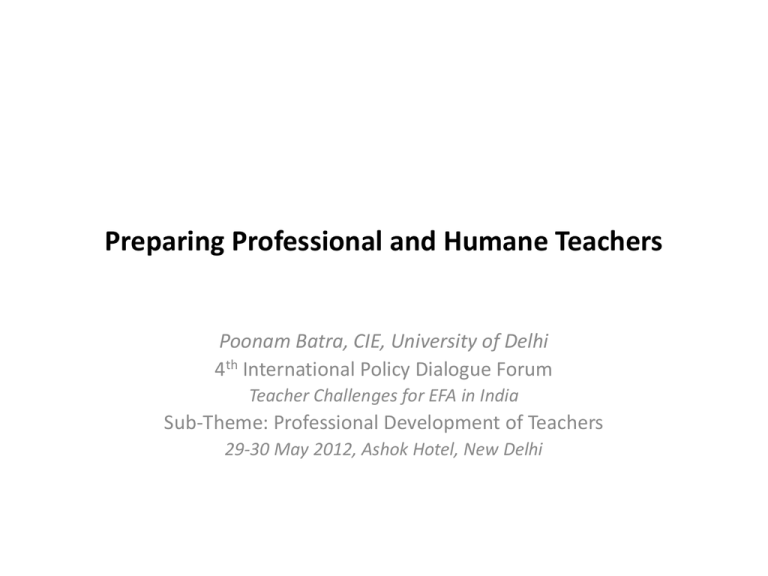
Preparing Professional and Humane Teachers Poonam Batra, CIE, University of Delhi 4th International Policy Dialogue Forum Teacher Challenges for EFA in India Sub-Theme: Professional Development of Teachers 29-30 May 2012, Ashok Hotel, New Delhi Key Contemporary Challenges • Rapid decline in the share of public school enrolment is a serious public policy question especially in the context of RtE. • While over 80 percent of India’s children are enrolled in state schools, over 80 percent of teacher education institutions operate in the private sector. • Even though out of school children have declined to 4 percent, those left behind are children of marginalised and minority communities. • Continuing low levels of learning compel us to look at issues of teacher preparation and professional support. 4/13/2015 Preparing Professional Teachers Poonam Batra 2 Demands of RtE • Estimates stand at 5.1 lakh additional teachers over and above the existing vacancies of 5.23 lakh to meet RtE stipulations. • Assam, Bihar, Chattisgarh, Jharkhand, Orissa, UP and West Bengal, apart from the north eastern states have been identified as states that grossly lag behind in their institutional capacity to educate teachers (GoI, 2011). • With 25 percent reservation for the economically weaker sections being upheld by the Supreme Court, greater demand to prepare teachers for diverse classrooms. 4/13/2015 Preparing Professional Teachers Poonam Batra 3 Changing Educational Discourse • The NCF, 2005 and NCFTE, 2009 have articulated major epistemological shifts in imagining the nation where constructs of local knowledge, active citizenship, diversity and inclusion attempt : To redefine curriculum To establish teaching as social practice • The ongoing debate on UEE and curriculum renewal has reiterated the close relationship between school and society. • This has created a renewed interest in an education that can empower children, their parents, and communities to change their lives in a way and at a pace that is meaningful to them. 4/13/2015 Preparing Professional Teachers Poonam Batra 4 Re-establishing the Social Transformation Agenda • the ongoing debate on social transformation and the nature of citizenship and national development in India provides new opportunities • There is imperative need to evolve specific measures to strengthen democracy, enhance the quality of life and ensure higher levels of social justice for all. • India is also in a unique moment when social movements and civil society initiatives have culminated in several progressive legislations. 4/13/2015 Preparing Professional Teachers Poonam Batra 5 Re-establishing the Social Transformation Agenda • This comes at a time when education is being positioned as central to the national project of creating a more equitable and just society • Education for citizenship has acquired a new meaning and the school is seen as the centre of an educative force that promises to develop ‘sensitive, interrogative, deliberative and transformative citizens.’ • Scholars have raised questions of multiple childhoods and the need to address social contexts of learning while designing curricula and the criticality of transforming teacher education in India • However, alongside this educational discourse, a policy discourse perceives education as a mere service to be delivered and closely monitored 4/13/2015 Preparing Professional Teachers Poonam Batra 6 Forced Choices • Therefore several issues, long debated, are being positioned as ‘forced choices’. These include: the conflict between private and public schooling arrangements; diversification and selectivity of the teacher workforce; multiple locations as the site for teacher preparation: state and university; private and public; long duration pre-service teacher education vs short-term measures of in-service training contradictions of simultaneous regulation and deregulation • The need is to examine the tension between policy imperatives and the lived reality of school education rather than position them as forced choices. 4/13/2015 Preparing Professional Teachers Poonam Batra 7 Tension between Educational and Policy Imperatives • The curriculum framework for schools (NCF, 2005) and teacher education (NCFTE, 2009), although in consonance with processes of policy-making are outside the domain of policy enforcement and the current instruments that are used to enable this. • Policy for instance, cannot ensure that a curriculum is interpreted as intended through the medium of a textbook. • Therefore, while school and teacher education curriculum speak of educating for and in a diverse society, • specific policy measures adopted, such as large scale testing of learning outcomes, seek to standardise school education. 4/13/2015 Preparing Professional Teachers Poonam Batra 8 Tension between Educational and Policy Imperatives • Likewise, policy makers focus on the need to enhance the quality of teachers and to bring teacher education in line with the perspective of National Curriculum Framework for Teacher Education (NCFTE), 2009, • Policy enforcement on the other hand, seeks to ensure teacher accountability rather than teacher development. 4/13/2015 Preparing Professional Teachers Poonam Batra 9 Shifts in the Policy Discourse • Tensions also exist in the ‘quality’ discourse with the entry of large scale corporate and linked civil society interventions. • For instance, ideas of learning guarantee through large scale testing of learning outcomes and teacher performance and management have begun to define the ‘quality’ dimension of education. • Simultaneously, commissioned educational research led to a discourse around aspects of teacher absenteeism (Kremer, 2005), teacher motivation and teacher accountability (Ramachandran, 2005) instructional time-on-task (Sankar, 2007). • This research has positioned the school teacher as the chief reason for the declining quality of school education, leading to an anti-teacher discourse. 4/13/2015 Preparing Professional Teachers Poonam Batra 10 Marginalising the Teacher • Several private initiatives across the country tend to view the school teacher as an object of reform and implementing agency. • Vacuous spaces created wait to be filled by for-profit agencies for whom education offers the prospects of a new market regime. • As a result ‘profit-making companies’ are marketing meticulously designed ‘lesson plans’ and other ‘teacherproof’ materials • These are designed for a cadre of school teachers with or without pre-service qualification to merely implement and increase learner performance. • This is likely to create a future confrontation with the executive and for-profit teacher education agencies. 4/13/2015 Preparing Professional Teachers Poonam Batra 11 Challenging Set Frames of Educating Teachers • The approach to the education of school teachers has remained unchanged for half a century in two crucial aspects: the institutionalised intellectual isolation of the school teacher and a circumscribed engagement with pedagogy as mere technique. • Psychology with an older engagement with concepts of learning and the psychometric tradition assumed an overarching influence on aspects of curriculum transaction and learning. • This happened through the customary rituals of training teachers. 4/13/2015 Preparing Professional Teachers Poonam Batra 12 Challenging Set Frames of Educating Teachers • Even within psychological theorisation, ideas that fitted well with a positivist orientation gained greater acceptability. • For instance, the computational model of the learner’s mind is considered to be more suitable because it is seen to provide a practical frame for the teacher. • This is so, despite a significant body of research that has established the situated nature of cognition and learning in social and cultural practice. 4/13/2015 Preparing Professional Teachers Poonam Batra 13 Oversimplified Psychological Frames • Thus teacher education courses have situated the pedagogic preparation of teachers within the frame of educational psychology, peripheralising constructs of the specific and the contextualised. • The overarching and oversimplified psychological frame forms the dominant sub-culture of teacher preparation, maintaining the false neutrality of teacher education programmes. • Thus teachers do not feel the need to examine the social and cultural factors that influence processes of schooling. • For most education remains a routinised classroom activity, the holding of examinations where the onus of learning rests with learners. 4/13/2015 Preparing Professional Teachers Poonam Batra 14 Institutional Cultures of Preparing Teachers • The institutional cultures of pre-service teacher education in India are also a consequence of their position in a system of higher education. • The bulk of secondary teacher education institutes offering BEd are outside university campuses. • Elementary teacher education institutes offering DEd are not linked to universities. • This is set to change with XII Plan proposals to restore the link between schools and higher education. 4/13/2015 Preparing Professional Teachers Poonam Batra 15 Reclaiming the ‘Space’ for Teachers • Envision to re-structure existing institutions and revamp the content and pedagogy of teacher education programmes • Envision new institutional arrangements to break the intellectual isolation of school teachers • Select Universities and Institutes of higher education are envisioned to establish Schools of Education to help develop education as an interdisciplinary enterprise • Schools of Education are envisaged to include centres that undertake in-depth work in neglected areas of school education 4/13/2015 Preparing Professional Teachers Poonam Batra 16 Developing a Professional Cadre of Elementary Teacher Educators • The translation of the DIET idea into successful practice can only happen if appropriate linkages with universities would root the required knowledge and professional expertise among teacher educators and teachers • There are proposals to upgrade DIETs to undergraduate colleges affiliated to state universities in a phased manner • This will enable them to offer 4-year integrated programmes of teacher education • Faculty renewal through cross-deployment across universities/NGOs/research institutions and personnel movements across DIETs based on professional merit (rather than transfers) are important possibilities 4/13/2015 Preparing Professional Teachers Poonam Batra 17 Recommendations I • Links between Universities and school education need to be strengthened across India • Power of this idea is visible in the engagement of university-based academics in the articulation of the NCF 2005, and NCERT’s new school textbooks • The two decade experience of the BElEd sets the example of an interdisciplinary Elementary Teacher Education Programme offered by undergraduate Colleges of the University of Delhi, Delhi • The MA programme in elementary education offered at TISS, Mumbai offers a model for the professional development of the professional cadres in EE 4/13/2015 Preparing Professional Teachers Poonam Batra 18 Recommendations II • Alongside teacher preparation, interdisciplinary platforms for educational research & practice and teacher support need to be established • This can be done through a focus on entry at the +2, undergraduate levels and lateral disciplinary entry in courses on education • National Institutes of excellence are envisioned to be drawn upon to fill critical gaps in mathematics and sciences • Inter-disciplinary postgraduate programmes of study with specialisation in curriculum studies, pedagogic studies and assessment need to be developed • This would help develop a cadre of professionals and in creating a body of contextually relevant knowledge 4/13/2015 Preparing Professional Teachers Poonam Batra 19 Recommendations III • The NCTE has developed a Teacher Education Curriculum Framework (NCFTE, 2009) that aligns well with the ideas that shape the School Curriculum Framework (NCF, 2005) • A model syllabi that articulates the rationale and objectives of each course in a pre-service teacher education programme , units of study and specified readings provides a frame to the states. • Revamped pre-service teacher education and continued professional development of school teachers need to be recognised as key long-term investments for achieving UEE. • This can only be achieved if the RTE Act is used as an opportunity to enforce structural changes in the teacher education sector, towards: recruitment; development of a professional cadre of teachers, teacher educators and researchers. 4/13/2015 Preparing Professional Teachers Poonam Batra 20 Conclusion • The plural fabric of Indian society provides a fertile possibility for institutionalizing learning as social activity and teaching as social practice giving fillip to the ongoing process of deepening democracy. • The true power of a knowledge society would be based on having a large mass of critical thinkers who can innovate, have agency to address a multitude of socio-political, economic and environmental challenges the country and their communities face. 4/13/2015 Preparing Professional Teachers Poonam Batra 21
